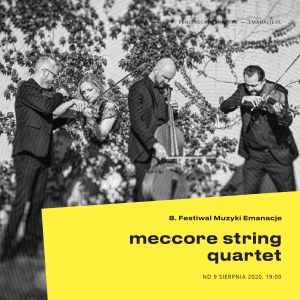
The next concert of the Emanacje Festival in Lusławice will take place on Sunday, 9 August 2020 at 7:00 p.m., presenting works by Beethoven and Penderecki – composers who were crossing the borders, paving new paths, and changing the face of music. In the year of the 250th anniversary of Beethoven's birth and the death of Krzysztof Penderecki, their music takes on a special meaning. The Meccore String Quartet, one of the most outstanding string quartets in Europe, will perform chamber works by both composers.
Beethoven is a unique figure in the history of music, a rebellious artist, eulogist of the revolution, a man full of contradictions. He boldly expressed with sound what for other composers remained unimaginable for a long time. Krzysztof Penderecki expressed a similar attitude. He was constantly surprising and delighting with his music. As noticed by Mieczysław Tomaszewski, it was Penderecki who invented the formula of the necessity to "be rooted twice in the earth and in heaven", he used the labyrinth metaphor as a symbol of the creative path, he dared to say what others perhaps sensed: "We found ourselves at the point where the most creative way is to open the door behind you". Penderecki's phenomenon consisted in the fact that even when he "opened the door behind him", he was still in the avant-garde movement.
Beethoven began working on his first cycle of six quartets, Op. 18 being less than 30 years old. He remained faithful to this genre throughout his life, subjecting it to revolutionary transformations and leading to an unprecedented flourish, the most striking example of which is the Grosse Fuge, Op. 133. Penderecki, like Beethoven, reached for the quartet genre before his thirties. His String Quartet No. 1, which can be described as a small sonorist poem, was written in 1960. The composer introduced surprising and unusual sonic effects strictly according to the rules of the "magic square". String Quartet No. 2 was written 8 years later, also being an expression of innovative explorations in terms of sound. While the aesthetics of the post-war avant-garde believed that the work accepted by the general public was not art, Penderecki was sure that the artist's mission was to create works that would find social resonance and connect people.
Media patronage: Polish Music Information Centre POLMIC.
Full programme is available at: www.emanacje.pl







